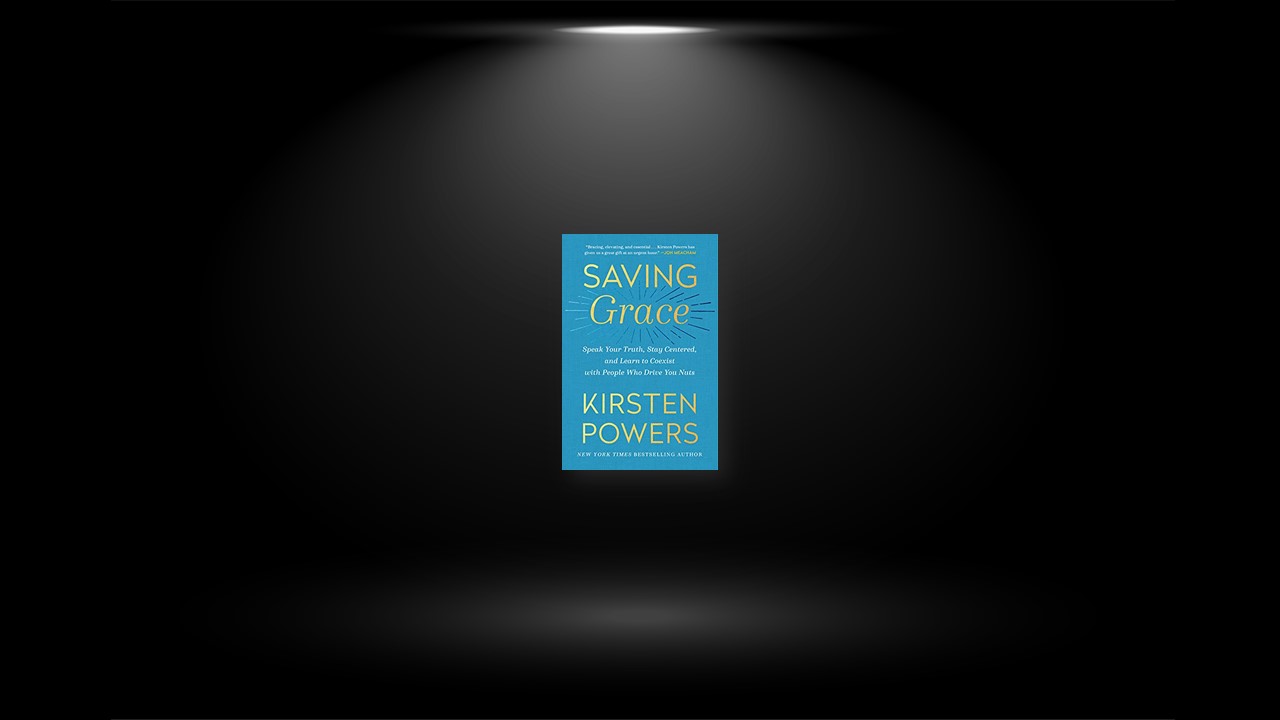The Thickness of Grace
Grace is what makes human coexistence possible. Every thriving relationship in history—between friends, family, communities, and countries—has been saturated with grace. Grace is what lets us stumble, fall, get back up, and try again. Grace is what welcomes you back after you have failed someone or failed yourself.
Grace is what the Franciscan priest and writer Richard Rohr calls “the ‘x’ factor.” It knits families, friendships, and countries back together after betrayal, hurt, and even violence. It’s the father running to embrace the prodigal son when he’s starving, penniless, and drenched in shame.2 It’s refusing to reduce people to the sum of their worst actions. We see it in the humility of the utterance “There but for the grace of God go I.”
True grace is otherworldly. It goes against every instinct we have to seek revenge for wrongs or to shame and humiliate people who have acted immorally or unethically. It is what the theologian Dorothee Sölle, who grew up in Nazi Germany, called “borrow[ing] the eyes of God.” It enables us to see the divinity in every person, no matter what they’ve done, what they believe, or who they voted for. Grace is giving other people space to not be you.
Grace is the original self-care. It shushes the hectoring inner critic that tells us we are too much, too little, too fat, too thin, too good, and not good enough. Grace invites us off the hedonic treadmill of relentless achievement and success, which never delivers the happiness it promises. Grace doesn’t care what size your waist is and celebrates every new wrinkle as evidence of wisdom earned. Grace shrugs at your unachieved New Years’ resolutions and teaches you to be kind to yourself, just because. Grace reminds you of the “love yourself” part of Jesus’s command “Love others as much as you love yourself.”
Beyond Good and Evil
There are two kinds of people in the world, as the joke goes: people who think there are two kinds of people, and people who don’t.
We love to sort people and ideas into opposing baskets. Dualistic thinking rules our discourse in a way that makes it almost impossible to have a discussion about controversial topics—and let’s face it: these days, almost any topic can invite controversy.
the reality is, integrating grace into our lives and our broader culture provides a world of options that don’t include abandoning all our principles or becoming doormats. However, the all-or-nothing paradigm is the default for many Americans, and it becomes even more so under duress. You either completely embrace and excuse other people’s bad behavior and beliefs or damn them to Hell. You are with me or against me. Staking out a stark position and never deviating from it is viewed as clear thinking and righteousness.
Dualistic thinking sets us against one another and creates toxic levels of conflict. It leads us to denounce wholesale people who disagree with us on political, ideological, or religious issues, because through the binary lens, a person could hold a differing view only because they are stupid, weak, craven, misinformed, selfish, or maybe even evil. Such thinking can leave us feeling perpetually annoyed by, angry at, or betrayed by people who don’t share our point of view.
But beware: our brains have a cognitive bias toward binary thinking. This bias serves as a mental shortcut when a quick decision is needed, such as if our lives are in danger. But for nonurgent situations that require deeper analysis, it can obscure more nuanced options.
When Grace Runs Out
While God’s grace is unlimited, here on earth humans have their breaking point.
If you take advantage of someone’s grace over and over, you shouldn’t be surprised when you discover their patience has reached its expiration date. If you refuse to empathize with, or listen to, a person or group of people, and they get tired of repeatedly explaining something to you, you may eventually suffer harsh consequences.
If this happens, it’s your fault, not theirs. They are not denying you grace; they are holding you accountable. Most of us have been in a relationship where someone has pushed things past the point of no return. We may have been the perpetrator or we may have been the victim. You tell your husband repeatedly that his close contact with female co-workers makes you feel disrespected. He tells you that you are too sensitive and need to stop acting like such a victim. You aren’t going to get divorced over this, so you offer him grace and try to move on.
It’s time for us to look at ourselves and take responsibility for the ways we’ve been apathetic, complicit, or worse in creating a need for marginalized groups to shock society out of its slumber. It’s time to repent for “what we have done, and what we have left undone,” as the confessional prayer goes. This requires, as the philosopher George Yancy has written, that “you look at parts of yourself that might cause pain and terror.” Yancy modeled this kind of personal accountability by writing a New York Times op-ed copping to his own sexism and the way he had failed to stand up for women in the past.
Just remember, grace is not a “get-out-of-jail-free” card. It’s not a weapon to be wielded to excuse or erase our failures. To believe either of these things is to make a grave category mistake. Rather than abusing the endless grace that so many of us have been shown, we should focus on pouring a portion of it back into the world as we labor toward the vision of a Beloved Community where there is such a love of our fellow citizens that we will accept nothing less than justice and equality for all.
What Goes in Must Come Out
Therapist Courtney Leak says that whenever she sees someone on social media tearing another person down, she wants to tell them, “How you show your outrage is proportionate to your wellness. Until you have done some work, be quiet on a public forum.”
She isn’t talking about people who use social media constructively to draw attention to important issues, or even to call out a person or organization that is causing harm. She’s referring to people who are ripping others to shreds, speaking to and about people with contempt, or riling up their followers to pile on another person for saying something offensive. She contrasts this kind of behavior with a call to action with constructive solutions, such as using the hashtag “MuteRKelly” to hold the R&B singer accountable for his sexual abuse of young Black women.
You should also examine whether you feel you “need” to check your favored news outlet or social media every hour or few hours. That’s a “tell,” as they say in poker, that you are addicted to the dopamine hit. If we’re being honest, many of us turn to social media or the news to be entertained, distracted, or numbed, not to become better citizens. We’ve become a reality TV–obsessed nation that often rewards people for the most toxic and immature behavior, even when discussing important issues.
We simply are not designed to bear the burdens of the entire world minute by minute or hour by hour. Our biologically built-in negativity bias—a function that gave our ancestors a heightened sense of awareness of predatory threats and natural dangers—has now hit its evolutionary wall. And even as our fatigued brains continue to seek out negativity, the “if it bleeds, it leads” media increasingly and deliberately supply it.
The good news is that you have significant control over the demand side. You can make a decision to change what you let into your head. Turn off your notifications, limit your news and social media consumption, and stay away from the rhetorical dope peddlers. You can trade in the sugar high of feeding your negativity bias and create space for more grace in your life right now.
Embrace Healthy Conflict
Perhaps one of the greatest misconceptions about grace is that it means being passive, or not standing up for your beliefs or not confronting people about problematic or harmful behavior. The image too many people have of a “graceful” person is of someone who just lets others do and say whatever they want and eschews the idea of accountability. They envision a person who doesn’t get angry and who, rather than speaking up about behavior that is causing harm, suffers quietly or allows others to suffer. When an argument breaks out, we think the person who tries to persuade everyone to just “get along” and not disrupt the peace is working to achieve grace. An appeaser, in other words. A doormat.
But grace is not about inaction or holding your tongue when you have something to say that might upset other people. It’s not a magic wand to make discord disappear. Discord is part of life—and the great religious traditions treat it as such. “Jesus’ teachings take conflict for granted,” theologian Barbara Brown Taylor has written. “You can’t love an enemy if you don’t have one. You can’t turn this cheek if no one slaps that one first.”
What Jesus taught was how to handle that conflict. In an essay on how to disagree, writer Paul Graham offers a helpful guide that if everyone debating politics, religion, and the like followed, we might actually be able to move past the pointless, frustrating, and rage-inducing arguments we often experience or witness online or in the media
Going from lowest forms of disagreeing to highest forms, he lists the four tactics that drive us completely bonkers: name calling; ad hominem attacks (attacks characteristics of writer but not substance of argument); responds to tone but not the actual argument; and contradiction, which is stating “the opposing case with little or no supporting evidence.”
Graham then moves to the higher forms: counterargument (contradicts and then backs up with reasoning and evidence) and refutation (finds the mistake and explains why it’s wrong, ideally using quotes). Finally, he shares the crème de la crème of argumentation: explicitly refute the central point the other person has made. When engaging in healthy conflict you should try to stay in the zone of counterargument, refutation, and focusing on the central argument. The point of healthy conflict is not to “win.” It’s to build understanding.


